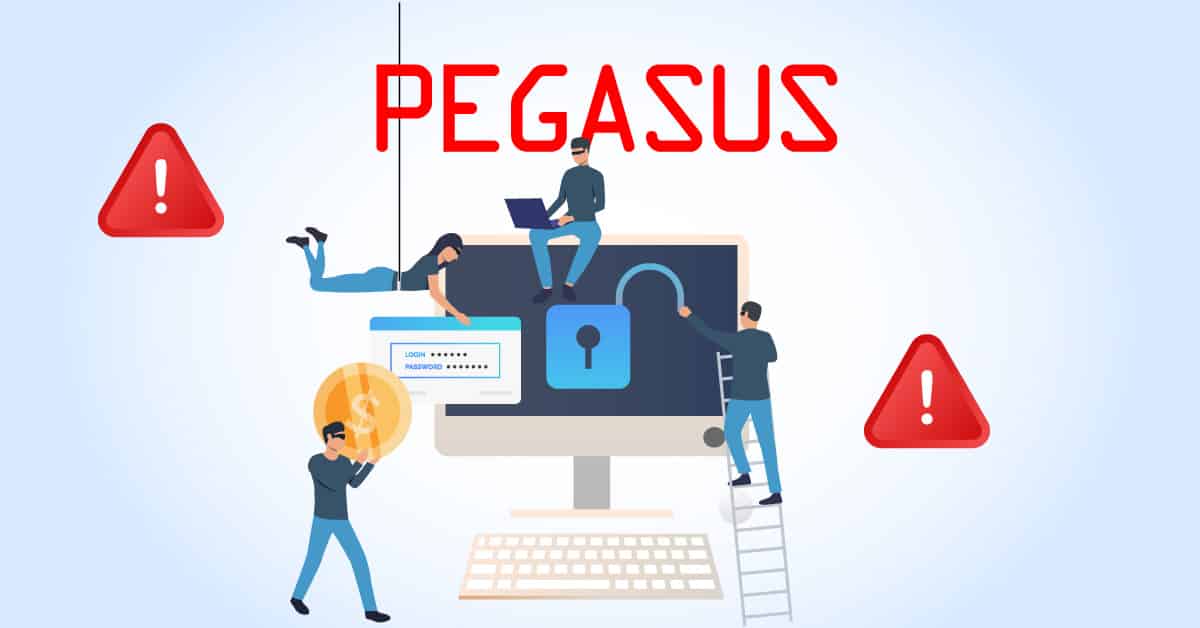Even though WhatsApp claims to be a secure network, its users have been targeted by the Pegasus spyware, which is alleged to have been developed by an Israeli cyber technology corporation.
The attack appears to have been directed at journalists, attorneys, Dalit activists, and at least two dozen professors, according to The Indian Express. There’s a good chance there’ll be more. Pegasus is said to provide anyone access to the information, chats, and photographs on your phone. In short, everything!
So, is there any way to tell whether you’ve been afflicted with Pegasus? What happens if your security is breached? Here’s what you need to know
What is Pegasus?
Pegasus Spyware is a malicious software that infiltrates your computer, collects your data, and sends it to a third party without your permission.
The Israeli firm, on the other hand, promotes it as a tool for tracking criminals and terrorists — not for mass surveillance, but for targeted spying. The software is only sold to governments by NSO Group. According to a price list from 2016, NSO Group charged $650,000 for infiltrating 10 devices, plus a $5000 installation cost.
How does Pegasus spyware target devices?
Pegasus takes advantage of software flaws known as zero-day vulnerabilities, which have yet to be patched. Pegasus used to access people’s smartphones through a link that they had to physically click on. However, thanks to a so-called zero-click assault, spyware can now infiltrate your phone without you having to interact with it. It may be a WhatsApp call that you didn’t have to answer.
Pegasus is reported to be exploiting a vulnerability in Apple’s iMessage that has yet to be patched today.
How do you prevent Pegasus from infiltrating on your device?
- When using your device, only open links from known and trustworthy contacts and sources. Pegasus is distributed via an iMessage link on Apple devices. And many cybercriminals use this strategy for both virus dissemination and less technical scams. The same precautions apply to URLs received by email or other messaging apps.
- Ensure that all required patches and upgrades are installed on your device. While having a standardised operating system provides a steady platform for attackers to target, it is still your best defence.
- If you’re using Android, don’t rely on notifications for new operating system updates. Because your device’s manufacturer may not be delivering updates, you should check for the most recent version yourself.
- Although it may seem self-evident, you should keep physical access to your phone to a minimum. Enable pin, finger, or face locking on the device to accomplish this. Securely configure your gadget.
- When viewing sensitive material, stay away from public and free WiFi (including hotels). When you need to use such networks, using a VPN is a fantastic alternative.
- Encrypt your device’s data and, if accessible, use remote erase features. If your smartphone is lost or stolen, you can be assured that your data will be safe.
To help people stay safe digitally, it’s always best to proactively exercise all the security measures you can take on a regular basis.

12 Comments
Phone Tracker Free - February 11, 2024
You can also customize monitoring for certain apps, and it will immediately start capturing phone screen snapshots regularly.
Allen Dave - October 24, 2024
Hello, as a newbie to cryptocurrency trading, I lost a lot of money trying to navigate the market on my own, then in my search for a genuine and trusted trader/broker, i came across Trader Bernie Doran who guided and helped me retrieve my lost cryptocurrencies and I made so much profit up to the tune of $60,000. I made my first investment with $2,000 and got a ROI profit of $25,000 in less than 2 week. You can contact this expert trader Mr Bernie Doran via Gmail : [email protected] or WhatsApp + 1 424 285 0682 and be ready to share your experience, tell him I referred you
binance - March 27, 2024
Thank you for your sharing. I am worried that I lack creative ideas. It is your article that makes me full of hope. Thank you. But, I have a question, can you help me?
tlovertonet - June 28, 2024
I would like to thank you for the efforts you’ve put in writing this web site. I am hoping the same high-grade website post from you in the upcoming as well. In fact your creative writing skills has inspired me to get my own website now. Really the blogging is spreading its wings fast. Your write up is a good example of it.
nejlepsí binance referencní kód - December 27, 2024
Can you be more specific about the content of your article? After reading it, I still have some doubts. Hope you can help me.
binance open account - January 9, 2025
Your article helped me a lot, is there any more related content? Thanks!
binance Регистрация - February 14, 2025
I don’t think the title of your article matches the content lol. Just kidding, mainly because I had some doubts after reading the article.
binance - February 23, 2025
Thank you for your sharing. I am worried that I lack creative ideas. It is your article that makes me full of hope. Thank you. But, I have a question, can you help me?
бнанс Реферальний код - March 20, 2025
I don’t think the title of your article matches the content lol. Just kidding, mainly because I had some doubts after reading the article.
binance account - April 9, 2025
Your article helped me a lot, is there any more related content? Thanks!
Fxhelzlt - May 28, 2025
اكتشف أفضل الكازينوهات على الإنترنت لعام 2025. قارن بين المكافآت واختيارات الألعاب ومصداقية أفضل المنصات لألعاب آمنة ومجزيةكازينو تشفير
100 USDT - June 2, 2025
I don’t think the title of your article matches the content lol. Just kidding, mainly because I had some doubts after reading the article.